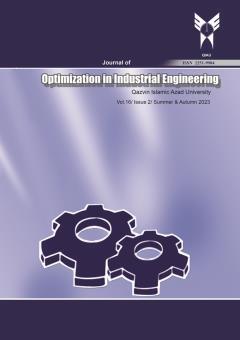Artificial Bee Colony to Solve the Berth Allocation and Crane Assignment Problem
Subject Areas : production scheduling and sequencingSara SOUAINI 1 * , Jamal Benhra 2 , Salma Mouatassim 3
1 - LARILE Laboratory, TEAM OSIL Hassan II University of Casablanca, Morocco
2 - LARILE Laboratory, TEAM OSIL Hassan II University of Casablanca, Morocco
3 - LARILE Laboratory, TEAM OSIL Hassan II University of Casablanca, Morocco
Keywords: Optimization , Scheduling , Berth Allocation , Crane Assignment , Artificial bee colony,
Abstract :
The efficient operation of container terminals relies on two crucial aspects: vessel scheduling and resource allocation. These tasks, considered NP-hard optimization problems, aim to minimize the total processing time of vessels at docks. While prior research predominantly focused on optimizing vessel arrival and departure times, recent studies emphasize the significance of addressing resource allocation challenges to enhance overall port efficiency. Recognizing this, our study employs a mathematical model to deepen understanding and elucidate inherent constraints. To effectively resolve the model, we employ the Artificial Bee Colony (ABC) algorithm. This algorithm is chosen for its efficacy in addressing scheduling problems characterized by limited identical resources, unitary processing, and non-repetitive tasks. By utilizing the mathematical model and ABC algorithm, our research aims to optimize vessel scheduling and resource allocation in container terminals. Ultimately, the goal is to minimize the total processing time of vessels at docks, thereby streamlining operations and improving port efficiency. This research contributes to the field by offering a comprehensive approach to address the intertwined issues of vessel scheduling and resource allocation. Its findings hold significance for stakeholders in maritime logistics, providing strategies to enhance service delivery and operational performance in container terminals.
DulebenetsMA (2020) An Adaptive Island evolutionary algorithm for the berth scheduling problem. Memetic Computing 12:51–72
Gu,W., Tang, D., Zheng, K(2012).Minimizingmake span in job-shop scheduling problem using an improved adaptive particle swarm optimization algorithm. In: Proceedings Control Decision Conference, Taiyuan, pp. 3189–3193
Issam EH, Azza L, Mohamed EM, Tabaa YA (2019) A modified sailfish optimizer to solve dynamic berth allocation problem in conventional container terminal. Int J Ind Eng Comput 10(4): 491–504
Karaboga, D., Akay, B.(2009) A survey: algorithms simulating bee swarm intelligence. Artif. Intell.Rev. 31, 61–85.
Karaboga, D., Basturk, B.(2008) On the performance of artificial bee colony (ABC) algorithm. Appl. Soft Comput. 8(1), 687–697.
Karaboga, D.(2005).An idea based on honey bee swarm for numerical optimization, Technical report- TR06, Erciyes university, eng. faculty, Comput. Eng. Dept., 2005, vol. 200
Kramer A, Lalla-Ruiz E, Iori M, Voß S (2019) Novel formulations and modeling enhancements for the dynamic berth allocation problem. Eur J Oper Res 278(1):170–185
Lalla-Ruiz E, Voß S (2016) POPMUSIC as a matheuristic for the berth allocation problem. Ann Math Artif Intell 76:173–189
Lassoued R, Elloumi A (2019) The discrete and dynamic berth allocation problem in bulk port. In: 6th international conference on control, decision and information technologies, pp 1976–1980
Maja Stojaković, Elen Twrdy. (2019). The Influence of Yard Trucks on Berth Operations in Smaller Container Terminals. POMORSTVO-Scientific Journal of Maritime Research, 33 (2019) 171-175
Nayak, V., Suthar, H.A., Gadit, J.(2012).Implementation of artificial bee colony algorithm. IAES Int. J. Artif. Intell. 1(3), 112.
Nishimura E, Imai A, Papadimitriou S (2001) Berth allocation planning in the public berth system by genetic algorithms. Eur J Oper Res 131:282–292
Pinedo M (2008) Scheduling: theory, algorithms, and systems. 4th Edition, Springer-Verlag, New York
Saharidis G, GoliasM, BoileM, Theofanis S, IerapetritouM(2010) The berth scheduling problem with customer differentiation: a new methodological approach based on hierarchical optimization. Int J Adv Manuf Technol 46(1–4):377–393
Sara S, Jamal B, Salma M. (2023). Artificial Bee Colony Applied to Scheduling in a Flowshop of Identical Machines. Springer Nature Switzerland AG 2023T. Masrour et al. (Eds.): A2IA 2023, LNNS 771, pp. 271–281, 2023.
Sheikholeslami A, Mardani M, Ayazi E, Arefkhani H (2020) A dynamic and discrete berth allocation problem in container terminals considering tide effects. Iranian Journal of Science and Technology, Transactions of Civil Engineering 44(1):369–376
Wang R, Nguyen TT, Li C, Jenkinson I, Yang Z, Kavakeb S (2019) Optimising discrete dynamic berth allocations in seaports using a levy flight based meta-heuristic. Swarm Evol Comput 44:1003–1017
Souaini, S., Benhra, J., Mouatassim, S. (2023). Artificial Bee Colony Applied to Scheduling in a Flowshop of Identical Machines. In: Masrour, T., El Hassani, I., Barka, N. (eds) Artificial Intelligence and Industrial Applications. A2IA 2023. Lecture Notes in Networks and Systems, vol 771. Springer, Cham. https://doi.org/10.1007/978-3-031-43524-9_19
Sara Souaini, Jamal Benhra; Optimal container storage plan built using the ant colony algorithm. AIP Conf. Proc. 22 March (2024) 2816 (1): 070005. https://doi.org/10.1063/5.0177429
Sara Souaini, Jamal Benhra (2021). Optimization of Container Storage under Reshuffling Constraints in a Seaport. International Journal of Computer Applications. 183, 21 ( Aug 2021), 29-34. DOI=10.5120/ijca2021921579 https://doi.org/10.5120/ijca2021921579

